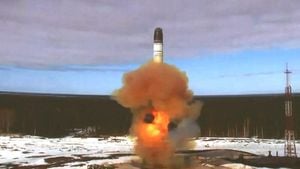Lockheed Martin has announced plans to acquire Terran Orbital, the Florida-based small-satellite manufacturer, for approximately $450 million. This strategic move, aimed at bolstering Lockheed's presence in the growing small satellite market, marks the defense giant's first acquisition from its Lockheed Martin Ventures portfolio.
The deal, which is expected to close by the end of 2024 pending regulatory approval, includes purchasing Terran’s outstanding common stock at 25 cents per share, significantly below previous bids. Lockheed had offered $1 per share earlier this year before retracting the bid amid Terran's financial difficulties.
Terran Orbital has been grappling with significant debt, reportedly around $300 million, and declining cash reserves, with just $14.6 million left by the end of July. Lockheed plans to retire this debt and establish a $30 million working capital facility to support Terran's operations leading up to the deal's finalization.
This acquisition builds on Lockheed's existing relationship with Terran, which has supplied satellites for its contracts, including those tied to the Space Development Agency's Transport and Tracking Layer operations. Lockheed has been Terran's largest customer, accounting for over 90% of its revenue backlog.
Terran Orbital, founded in 2013, has developed rapidly, focusing on producing satellites for clients such as the Department of Defense and NASA. The company recently shifted its production strategy from large facilities to more robotic manufacturing methods, aligning with market demand for faster and more cost-effective solutions.
Executives from both companies expressed optimism about the merger. Robert Lightfoot, president of Lockheed Martin Space, highlighted the alignment of Terran's capabilities with Lockheed’s strategic plans and the potential for accelerated technology development.
Terran CEO Marc Bell echoed these sentiments, stating the acquisition will provide access to Lockheed’s engineers and facilities, enhancing their ability to deliver innovative satellite solutions efficiently. He noted this collaboration could help prioritize their plans for mass robotic production of small satellites.
The acquisition also reflects broader industry trends, where the Department of Defense's priorities have shifted toward smaller, more nimble spacecraft. Lockheed aims to compete more aggressively with other major players like SpaceX and Blue Origin, who have also expanded their focus on small satellite technologies.
This acquisition follows several strategic adjustments within Terran, which sought various options to navigate its financial strain, including potential additional debt or partnerships. The pullback from its original bid indicates Lockheed's cautious approach amid Terran's uncertain financial standing.
Investors reacted positively to the news, with Lockheed’s stock seeing slight increases following the announcement. The acquisition is anticipated to provide new growth opportunities for both companies, particularly as demand for small satellite capabilities continues to rise globally.
The satellite manufacturing market has seen transformative changes with the entry of startups focused on low-cost, high-volume production models. Terran’s innovative approach aims to disrupt the traditional paradigm of satellite manufacturing by utilizing advanced robotics and automation.
Through this acquisition, Lockheed Martin not only secures Terran's technology but also its expertise and established market presence, positioning itself firmly within the rapidly evolving aerospace sector. This move underscores the increasing importance of versatility and speed within satellite manufacturing, reinforcing Lockheed’s commitment to remaining at the forefront of aerospace innovation.
Marc Bell’s vision for Terran includes expansion beyond current operations, with aspirations to deliver significant satellite production capabilities for emerging commercial space markets. This acquisition may serve as the catalyst for realizing those ambitions.



